- Home
- E. F. Benson
Miss Mapp
Miss Mapp Read online
Produced by Malcolm Farmer, LN Yaddanapudi and the OnlineDistributed Proofreading Team at https://www.pgdp.net (Thisfile was produced from images generously made availableby The Internet Archive/Canadian Libraries)
_MISS MAPP_
_By E. F. Benson, Author of "Queen Lucia." "Dodo Wonders." &c._
_McCLELLAND & STEWART, LTD., TORONTO_
PREFACE
I lingered at the window of the garden-room from which Miss Mapp sooften and so ominously looked forth. To the left was the front of herhouse, straight ahead the steep cobbled way, with a glimpse of the HighStreet at the end, to the right the crooked chimney and the church.
The street was populous with passengers, but search as I might, I couldsee none who ever so remotely resembled the objects of her vigilance.
E. F. BENSON.
Lamb House, Rye.
_Printed in Great Britain._
CHAPTER I
Miss Elizabeth Mapp might have been forty, and she had taken advantageof this opportunity by being just a year or two older. Her face was ofhigh vivid colour and was corrugated by chronic rage and curiosity; butthese vivifying emotions had preserved to her an astonishing activity ofmind and body, which fully accounted for the comparative adolescencewith which she would have been credited anywhere except in the charminglittle town which she had inhabited so long. Anger and the gravestsuspicions about everybody had kept her young and on the boil.
She sat, on this hot July morning, like a large bird of prey at the veryconvenient window of her garden-room, the ample bow of which formed astrategical point of high value. This garden-room, solid and spacious,was built at right angles to the front of her house, and looked straightdown the very interesting street which debouched at its lower end intothe High Street of Tilling. Exactly opposite her front door the roadturned sharply, so that as she looked out from this projecting window,her own house was at right angles on her left, the street in questionplunged steeply downwards in front of her, and to her right shecommanded an uninterrupted view of its further course which terminatedin the disused graveyard surrounding the big Norman church. Anything ofinterest about the church, however, could be gleaned from a guide-book,and Miss Mapp did not occupy herself much with such coldly venerabletopics. Far more to her mind was the fact that between the church andher strategic window was the cottage in which her gardener lived, andshe could thus see, when not otherwise engaged, whether he went homebefore twelve, or failed to get back to her garden again by one, for hehad to cross the street in front of her very eyes. Similarly she couldobserve whether any of his abandoned family ever came out from hergarden door weighted with suspicious baskets, which might containsmuggled vegetables. Only yesterday morning she had hurried forth with adangerous smile to intercept a laden urchin, with inquiries as to whatwas in "that nice basket." On that occasion that nice basket had provedto contain a strawberry net which was being sent for repair to thegardener's wife; so there was nothing more to be done except verify itsreturn. This she did from a side window of the garden-room whichcommanded the strawberry beds; she could sit quite close to that, for itwas screened by the large-leaved branches of a fig-tree and she couldspy unseen.
Otherwise this road to the right leading up to the church was of nogreat importance (except on Sunday morning, when she could get apractically complete list of those who attended Divine Service), for noone of real interest lived in the humble dwellings which lined it. Tothe left was the front of her own house at right angles to the strategicwindow, and with regard to that a good many useful observations mightbe, and were, made. She could, from behind a curtain negligentlyhalf-drawn across the side of the window nearest the house, have an eyeon her housemaid at work, and notice if she leaned out of a window, ormade remarks to a friend passing in the street, or waved salutationswith a duster. Swift upon such discoveries, she would execute a flankmarch across the few steps of garden and steal into the house,noiselessly ascend the stairs, and catch the offender red-handed at thispublic dalliance. But all such domestic espionage to right and left wasflavourless and insipid compared to the tremendous discoveries whichdaily and hourly awaited the trained observer of the street that laydirectly in front of her window.
There was little that concerned the social movements of Tilling thatcould not be proved, or at least reasonably conjectured, from MissMapp's eyrie. Just below her house on the left stood Major Flint'sresidence, of Georgian red brick like her own, and opposite was that ofCaptain Puffin. They were both bachelors, though Major Flint wasgenerally supposed to have been the hero of some amazingly amorousadventures in early life, and always turned the subject with greatabruptness when anything connected with duelling was mentioned. It wasnot, therefore, unreasonable to infer that he had had experiences of abloody sort, and colour was added to this romantic conjecture by thefact that in damp, rheumatic weather his left arm was very stiff, and hehad been known to say that his wound troubled him. What wound that wasno one exactly knew (it might have been anything from a vaccination markto a sabre-cut), for having said that his wound troubled him, he wouldinvariably add: "Pshaw! that's enough about an old campaigner"; andthough he might subsequently talk of nothing else except the oldcampaigner, he drew a veil over his old campaigns. That he had seenservice in India was, indeed, probable by his referring to lunch astiffin, and calling to his parlour-maid with the ejaculation of"Qui-hi." As her name was Sarah, this was clearly a reminiscence of daysin bungalows. When not in a rage, his manner to his own sex was bluffand hearty; but whether in a rage or not, his manner to the fairies, orlovely women, was gallant and pompous in the extreme. He certainly had alock of hair in a small gold specimen case on his watch-chain, and hadbeen seen to kiss it when, rather carelessly, he thought that he wasunobserved.
Miss Mapp's eye, as she took her seat in her window on this sunny Julymorning, lingered for a moment on the Major's house, before sheproceeded to give a disgusted glance at the pictures on the back page ofher morning illustrated paper, which chiefly represented young womendancing in rings in the surf, or lying on the beach in attitudes whichMiss Mapp would have scorned to adjust herself to. Neither the Major norCaptain Puffin were very early risers, but it was about time that thefirst signals of animation might be expected. Indeed, at this moment,she quite distinctly heard that muffled roar which to her experiencedear was easily interpreted to be "Qui-hi!"
"So the Major has just come down to breakfast," she mechanicallyinferred, "and it's close on ten o'clock. Let me see: Tuesday, Thursday,Saturday--Porridge morning."
Her penetrating glance shifted to the house exactly opposite to that inwhich it was porridge morning, and even as she looked a hand was thrustout of a small upper window and deposited a sponge on the sill. Thenfrom the inside the lower sash was thrust firmly down, so as to preventthe sponge from blowing away and falling into the street. CaptainPuffin, it was therefore clear, was a little later than the Major thatmorning. But he always shaved and brushed his teeth before his bath, sothat there was but a few minutes between them.
General manoeuvres in Tilling, the gradual burstings of fluttering lifefrom the chrysalis of the night, the emergence of the ladies of the townwith their wicker-baskets in their hands for housekeeping purchases, theexodus of men to catch the 11.20 a.m. steam-tram out to the golf links,and other first steps in the duties and diversions of the day, did notget into full swing till half-past ten, and Miss Mapp had ample time toskim the headlines of her paper and indulge in chaste meditations aboutthe occupants of these two houses, before she need really make herselfalert to miss nothing. Of the two, Major Flint, without doubt, was themore attractive to the feminine sense; for years Miss Mapp had tried tocajole him into marrying her, and had not nearly finished yet. With hisrecord of adventure, with the romantic reek of India (and camphor) inthe tiger-sk
in of the rugs that strewed his hall and surged like arising tide up the wall, with his haughty and gallant manner, with hisloud pshawings and sniffs at "nonsense and balderdash," his thumpings onthe table to emphasize an argument, with his wound and his prodigiousswipes at golf, his intolerance of any who believed in ghosts, microbesor vegetarianism, there was something dashing and risky about him; youfelt that you were in the presence of some hot coal straight from thefurnace of creation. Captain Puffin, on the other hand, was of clay sodifferent that he could hardly be considered to be made of clay at all.He was lame and short and meagre, with strings of peaceful beads andPapuan aprons in his hall instead of wild tiger-skins, and had a jerky,inattentive manner and a high pitched voice. Yet to Miss Mapp's mindthere was something behind his unimpressiveness that had a mysteriousquality--all the more so, because nothing of it appeared on the surface.Nobody could call Major Flint, with his bawlings and his sniffings, theleast mysterious. He laid all his loud cards on the table, great hulkingkings and aces. But Miss Mapp felt far from sure that Captain Puffin didnot hold a joker which would some time come to light. The idea of beingMrs. Puffin was not so attractive as the other, but she occasionallygave it her remote consideration.
Yet there was mystery about them both, in spite of the fact that most oftheir movements were so amply accounted for. As a rule, they played golftogether in the morning, reposed in the afternoon, as could easily beverified by anyone standing on a still day in the road between theirhouses and listening to the loud and rhythmical breathings that fannedthe tranquil air, certainly went out to tea-parties afterwards andplayed bridge till dinner-time; or if no such entertainment wasproffered them, occupied arm-chairs at the country club, or laboriouslyamassed a hundred at billiards. Though tea-parties were profuse, diningout was very rare at Tilling; Patience or a jig-saw puzzle occupied thehour or two that intervened between domestic supper and bed-time; butagain and again, Miss Mapp had seen lights burning in the sitting-roomof those two neighbours at an hour when such lights as were still inevidence at Tilling were strictly confined to bedrooms, and should,indeed, have been extinguished there. And only last week, being pluckedfrom slumber by some unaccountable indigestion (for which she blamed asmall green apple), she had seen at no less than twelve-thirty in themorning the lights in Captain Puffin's sitting-room still shiningthrough the blind. This had excited her so much that at risk of topplinginto the street, she had craned her neck from her window, and observed asimilar illumination in the house of Major Flint. They were not togetherthen, for in that case any prudent householder (and God knew that theyboth of them scraped and saved enough, or, if He didn't know, Miss Mappdid) would have quenched his own lights, if he were talking to hisfriend in his friend's house. The next night, the pangs of indigestionhaving completely vanished, she set her alarum clock at the sametimeless hour, and had observed exactly the same phenomenon. Such latehours, of course, amply accounted for these late breakfasts; but why, soMiss Mapp pithily asked herself, why these late hours? Of course theyboth kept summer-time, whereas most of Tilling utterly refused (exceptwhen going by train) to alter their watches because Mr. Lloyd Georgetold them to; but even allowing for that ... then she perceived thatsummer-time made it later than ever for its adherents, so that was noexcuse.
Miss Mapp had a mind that was incapable of believing the improbable, andthe current explanation of these late hours was very improbable, indeed.Major Flint often told the world in general that he was revising hisdiaries, and that the only uninterrupted time which he could find inthis pleasant whirl of life at Tilling was when he was alone in theevening. Captain Puffin, on his part, confessed to a student's curiosityabout the ancient history of Tilling, with regard to which he waspreparing a monograph. He could talk, when permitted, by the hour aboutthe reclamation from the sea of the marsh land south of the town, andabout the old Roman road which was built on a raised causeway, of whichtraces remained; but it argued, so thought Miss Mapp, an unprecedentedegoism on the part of Major Flint, and an equally unprecedented love ofantiquities on the part of Captain Puffin, that they should prosecutetheir studies (with gas at the present price) till such hours. No; MissMapp knew better than that, but she had not made up her mind exactlywhat it was that she knew. She mentally rejected the idea that egoism(even in these days of diaries and autobiographies) and antiquitiesaccounted for so much study, with the same healthy intolerance withwhich a vigorous stomach rejects unwholesome food, and did not allowherself to be insidiously poisoned by its retention. But as she took upher light aluminium opera-glasses to make sure whether it was IsabelPoppit or not who was now stepping with that high, prancing tread intothe stationer's in the High Street, she exclaimed to herself, for thethree hundred and sixty-fifth time after breakfast: "It's verybaffling"; for it was precisely a year to-day since she had first seenthose mysterious midnight squares of illuminated blind. "Baffling," infact, was a word that constantly made short appearances in Miss Mapp'svocabulary, though its retention for a whole year over one subject wasunprecedented. But never yet had "baffled" sullied her wells of pureundefiled English.
Movement had begun; Mrs. Plaistow, carrying her wicker basket, cameround the corner by the church, in the direction of Miss Mapp's window,and as there was a temporary coolness between them (following violentheat) with regard to some worsted of brilliant rose-madder hue, which aforgetful draper had sold to Mrs. Plaistow, having definitely promisedit to Miss Mapp ... but Miss Mapp's large-mindedness scorned to recallthe sordid details of this paltry appropriation. The heat had quitesubsided, and Miss Mapp was, for her part, quite prepared to let thecoolness regain the normal temperature of cordiality the moment thatMrs. Plaistow returned that worsted. Outwardly and publicly friendlyrelationships had been resumed, and as the coolness had lasted six weeksor so, it was probable that the worsted had already been incorporatedinto the ornamental border of Mrs. Plaistow's jumper or winter scarf,and a proper expression of regret would have to do instead. So thenearer Mrs. Plaistow approached, the more invisible she became to MissMapp's eye, and when she was within saluting distance had vanishedaltogether. Simultaneously Miss Poppit came out of the stationer's inthe High Street.
Mrs. Plaistow turned the corner below Miss Mapp's window, and wentbobbing along down the steep hill. She walked with the motion of thosemechanical dolls sold in the street, which have three legs set as spokesto a circle, so that their feet emerge from their dress with Dutch andrigid regularity, and her figure had a certain squat rotundity thatsuited her gait. She distinctly looked into Captain Puffin's dining-roomwindow as she passed, and with the misplaced juvenility socharacteristic of her waggled her plump little hand at it. At the cornerbeyond Major Flint's house she hesitated a moment, and turned off downthe entry into the side street where Mr. Wyse lived. The dentist livedthere, too, and as Mr. Wyse was away on the continent of Europe, Mrs.Plaistow was almost certain to be visiting the other. Rapidly Miss Mappremembered that at Mrs. Bartlett's bridge party yesterday Mrs. Plaistowhad selected soft chocolates for consumption instead of those stuffedwith nougat or almonds. That furnished additional evidence for thedentist, for generally you could not get a nougat chocolate at all ifGodiva Plaistow had been in the room for more than a minute or two....As she crossed the narrow cobbled roadway, with the grass growingluxuriantly between the rounded pebbles, she stumbled and recoveredherself with a swift little forward run, and the circular feet twinkledwith the rapidity of those of a thrush scudding over the lawn.
By this time Isabel Poppit had advanced as far as the fish shop threedoors below the turning down which Mrs. Plaistow had vanished. Herprancing progress paused there for a moment, and she waited with oneknee highly elevated, like a statue of a curveting horse, before shefinally decided to pass on. But she passed no further than the fruitshop next door, and took the three steps that elevated it from thestreet in a single prance, with her Roman nose high in the air.Presently she emerged, but with no obvious rotundity like that of amelon projecting from her basket, so that Miss Mapp could see exactlywhat she
had purchased, and went back to the fish shop again. Surely shewould not put fish on the top of fruit, and even as Miss Mapp's lucidintelligence rejected this supposition, the true solution struck her."Ice," she said to herself, and, sure enough, projecting from the top ofMiss Poppit's basket when she came out was an angular peak, wrapped upin paper already wet.
Miss Poppit came up the street and Miss Mapp put up her illustratedpaper again, with the revolting picture of the Brighton sea-nymphsturned towards the window. Peeping out behind it, she observed that MissPoppit's basket was apparently oozing with bright venous blood, andfelt certain that she had bought red currants. That, coupled with theice, made conjecture complete. She had bought red currants slightlydamaged (or they would not have oozed so speedily), in order to makethat iced red-currant fool of which she had so freely partaken at MissMapp's last bridge party. That was a very scurvy trick, for icedred-currant fool was an invention of Miss Mapp's, who, when it waspraised, said that she inherited the recipe from her grandmother. ButMiss Poppit had evidently entered the lists against Grandmamma Mapp, andshe had as evidently guessed that quite inferior fruit--fruit that wasdistinctly "off," was undetectable when severely iced. Miss Mapp couldonly hope that the fruit in the basket now bobbing past her window wasso much "off" that it had begun to ferment. Fermented red-currant foolwas nasty to the taste, and, if persevered in, disastrous in itseffects. General unpopularity might be needed to teach Miss Poppit notto trespass on Grandmamma Mapp's preserves.
Isabel Poppit lived with a flashy and condescending mother just roundthe corner beyond the gardener's cottage, and opposite the west end ofthe church. They were comparatively new inhabitants of Tilling, havingsettled here only two or three years ago, and Tilling had not yet quiteceased to regard them as rather suspicious characters. Suspicionsmouldered, though it blazed no longer. They were certainly rich, andMiss Mapp suspected them of being profiteers. They kept a butler, ofwhom they were both in considerable awe, who used almost to shrug hisshoulders when Mrs. Poppit gave him an order: they kept a motor-car towhich Mrs. Poppit was apt to allude more frequently than would havebeen natural if she had always been accustomed to one, and they went toSwitzerland for a month every winter and to Scotland "for theshooting-season," as Mrs. Poppit terribly remarked, every summer. Thisall looked very black, and though Isabel conformed to the manners ofTilling in doing household shopping every morning with her wickerbasket, and buying damaged fruit for fool, and in dressing in theoriginal home-made manner indicated by good breeding and narrow incomes,Miss Mapp was sadly afraid that these habits were not the outcome ofchaste and instinctive simplicity, but of the ambition to be received bythe old families of Tilling as one of them. But what did a trueTillingite want with a butler and a motor-car? And if these were notsufficient to cast grave doubts on the sincerity of the inhabitants of"Ye Smalle House," there was still very vivid in Miss Mapp's mind thatdreadful moment, undimmed by the years that had passed over it, whenMrs. Poppit broke the silence at an altogether too sumptuous lunch byasking Mrs. Plaistow if she did not find the super-tax a grievous burdenon "our little incomes." ... Miss Mapp had drawn in her breath sharply,as if in pain, and after a few gasps turned the conversation.... Worstof all, perhaps, because more recent, was the fact that Mrs. Poppit hadjust received the dignity of the M.B.E., or Member of the Order of theBritish Empire, and put it on her cards too, as if to keep the scandalalive. Her services in connection with the Tilling hospital had beenentirely confined to putting her motor-car at its disposal when she didnot want it herself, and not a single member of the Tilling WorkingClub, which had knitted its fingers to the bone and made enoughseven-tailed bandages to reach to the moon, had been offered a similardecoration. If anyone had she would have known what to do: a stingingletter to the Prime Minister saying that she worked not with hope ofdistinction, but from pure patriotism, would have certainly been MissMapp's rejoinder. She actually drafted the letter, when Mrs. Poppit'sname appeared, and diligently waded through column after column ofsubsequent lists, to make sure that she, the originator of the TillingWorking Club, had not been the victim of a similar insult.
Mrs. Poppit was a climber: that was what she was, and Miss Mapp wasobliged to confess that very nimble she had been. The butler and themotor-car (so frequently at the disposal of Mrs. Poppit's friends) andthe incessant lunches and teas had done their work; she had fed ratherthan starved Tilling into submission, and Miss Mapp felt that she aloneupheld the dignity of the old families. She was positively the only oldfamily (and a solitary spinster at that) who had not surrendered to thePoppits. Naturally she did not carry her staunchness to the extent, soto speak, of a hunger-strike, for that would be singular conduct, onlyworthy of suffragettes, and she partook of the Poppits' hospitality tothe fullest extent possible, but (here her principles came in) she neverreturned the hospitality of the Member of the British Empire, though sheoccasionally asked Isabel to her house, and abused her soundly on allpossible occasions....
This spiteful retrospect passed swiftly and smoothly through Miss Mapp'smind, and did not in the least take off from the acuteness with whichshe observed the tide in the affairs of Tilling which, after the ebb ofthe night, was now flowing again, nor did it, a few minutes afterIsabel's disappearance round the corner, prevent her from hearing thefaint tinkle of the telephone in her own house. At that she started toher feet, but paused again at the door. She had shrewd suspicions abouther servants with regard to the telephone: she was convinced (though atpresent she had not been able to get any evidence on the point) thatboth her cook and her parlourmaid used it for their own base purposes ather expense, and that their friends habitually employed it forconversation with them. And perhaps--who knows?--her housemaid was theworst of the lot, for she affected an almost incredible stupidity withregard to the instrument, and pretended not to be able either to speakthrough it or to understand its cacklings. All that might very well beassumed in order to divert suspicion, so Miss Mapp paused by the door tolet any of these delinquents get deep in conversation with her friend: asoft and stealthy advance towards the room called the morning-room (asmall apartment opening out of the hall, and used chiefly for thebestowal of hats and cloaks and umbrellas) would then enable her tocatch one of them red-mouthed, or at any rate to overhear fragments ofconversation which would supply equally direct evidence.
She had got no further than the garden-door into her house when Withers,her parlourmaid, came out. Miss Mapp thereupon began to smile and hum atune. Then the smile widened and the tune stopped.
"Yes, Withers?" she said. "Were you looking for me?"
"Yes, Miss," said Withers. "Miss Poppit has just rung you up----"
Miss Mapp looked much surprised.
"And to think that the telephone should have rung without my hearingit," she said. "I must be growing deaf, Withers, in my old age. Whatdoes Miss Poppit want?"
"She hopes you will be able to go to tea this afternoon and play bridge.She expects that a few friends may look in at a quarter to four."
A flood of lurid light poured into Miss Mapp's mind. To expect that afew friends may look in was the orthodox way of announcing a regularparty to which she had not been asked, and Miss Mapp knew as if by aspecial revelation that if she went, she would find that she made theeighth to complete two tables of bridge. When the butler opened thedoor, he would undoubtedly have in his hand a half sheet of paper onwhich were written the names of the expected friends, and if thecaller's name was not on that list, he would tell her with brazenimpudence that neither Mrs. Poppit nor Miss Poppit were at home, while,before the baffled visitor had turned her back, he would admit anothercaller who duly appeared on his reference paper.... So then the Poppitswere giving a bridge-party to which she had only been bidden at the lastmoment, clearly to take the place of some expected friend who haddeveloped influenza, lost an aunt or been obliged to go to London: here,too, was the explanation of why (as she had overheard yesterday) MajorFlint and Captain Puffin were only intending to play one round of golfto-day, and to come ba
ck by the 2.20 train. And why seek any further forthe explanation of the lump of ice and the red currants (probablydamaged) which she had observed Isabel purchase? And anyone could see(at least Miss Mapp could) why she had gone to the stationer's in theHigh Street just before. Packs of cards.
Who the expected friend was who had disappointed Mrs. Poppit could bethought out later: at present, as Miss Mapp smiled at Withers and hummedher tune again, she had to settle whether she was going to be delightedto accept, or obliged to decline. The argument in favour of beingobliged to decline was obvious: Mrs. Poppit deserved to be "served out"for not including her among the original guests, and if she declined itwas quite probable that at this late hour her hostess might not be ableto get anyone else, and so one of her tables would be completelyspoiled. In favour of accepting was the fact that she would get a rubberof bridge and a good tea, and would be able to say somethingdisagreeable about the red-currant fool, which would serve Miss Poppitout for attempting to crib her ancestral dishes....
A bright, a joyous, a diabolical idea struck her, and she went herselfto the telephone, and genteelly wiped the place where Withers hadprobably breathed on it.
"So kind of you, Isabel," she said, "but I am very busy to-day, and youdidn't give me much notice, did you? So I'll try to look in if I can,shall I? I might be able to squeeze it in."
There was a pause, and Miss Mapp knew that she had put Isabel in a hole.If she successfully tried to get somebody else, Miss Mapp might find shecould squeeze it in, and there would be nine. If she failed to getsomeone else, and Miss Mapp couldn't squeeze it in, then there would beseven.... Isabel wouldn't have a tranquil moment all day.
"Ah, do squeeze it in," she said in those horrid wheedling tones whichfor some reason Major Flint found so attractive. That was one of theweak points about him, and there were many, many others. But that wasamong those which Miss Mapp found it difficult to condone.
"If I possibly can," said Miss Mapp. "But at this late hour--Good-bye,dear, or only _au reservoir_, we hope."
She heard Isabel's polite laugh at this nearly new and deliciousMalaprop before she rang off. Isabel collected malaprops and wrote themout in a note book. If you reversed the note-book and began at the otherend, you would find the collection of Spoonerisms, which were veryamusing, too.
Tea, followed by a bridge-party, was, in summer, the chief manifestationof the spirit of hospitality in Tilling. Mrs. Poppit, it is true, hadattempted to do something in the way of dinner-parties, but though shewas at liberty to give as many dinner-parties as she pleased, nobodyelse had followed her ostentatious example. Dinner-parties entailed ahigher scale of living; Miss Mapp, for one, had accurately counted thecost of having three hungry people to dinner, and found that one suchdinner-party was not nearly compensated for, in the way of expense, bybeing invited to three subsequent dinner-parties by your guests.Voluptuous teas were the rule, after which you really wanted no morethan little bits of things, a cup of soup, a slice of cold tart, or adished-up piece of fish and some toasted cheese. Then, after theexcitement of bridge (and bridge was very exciting in Tilling), ajig-saw puzzle or Patience cooled your brain and composed your nerves.In winter, however, with its scarcity of daylight, Tilling commonly gaveevening bridge-parties, and asked the requisite number of friends todrop in after dinner, though everybody knew that everybody else had onlypartaken of bits of things. Probably the ruinous price of coal hadsomething to do with these evening bridge-parties, for the fire thatwarmed your room when you were alone would warm all your guests as well,and then, when your hospitality was returned, you could let yoursitting-room fire go out. But though Miss Mapp was already planningsomething in connection with winter bridge, winter was a long way offyet....
Before Miss Mapp got back to her window in the garden-room Mrs. Poppit'sgreat offensive motor-car, which she always alluded to as "the Royce,"had come round the corner and, stopping opposite Major Flint's house,was entirely extinguishing all survey of the street beyond. It was clearenough then that she had sent the Royce to take the two out to thegolf-links, so that they should have time to play their round and catchthe 2.20 back to Tilling again, so as to be in good time for thebridge-party. Even as she looked, Major Flint came out of his house onone side of the Royce and Captain Puffin on the other. The Royceobstructed their view of each other, and simultaneously each of themshouted across to the house of the other. Captain Puffin emitted a loud"Coo-ee, Major," (an Australian ejaculation, learned on his voyages),while Major Flint bellowed "Qui-hi, Captain," which, all the world knew,was of Oriental origin. The noise each of them made prevented him fromhearing the other, and presently one in a fuming hurry to start ranround in front of the car at the precise moment that the other ran roundbehind it, and they both banged loudly on each other's knockers. Theseknocks were not so precisely simultaneous as the shouts had been, andthis led to mutual discovery, hailed with peals of falsetto laughter onthe part of Captain Puffin and the more manly guffaws of the Major....After that the Royce lumbered down the grass-grown cobbles of thestreet, and after a great deal of reversing managed to turn the corner.
Miss Mapp set off with her basket to do her shopping. She carried in itthe weekly books, which she would leave, with payment but not withoutargument, at the tradesmen's shops. There was an item for suet whichshe intended to resist to the last breath in her body, though herbutcher would probably surrender long before that. There was an item foreggs at the dairy which she might have to pay, though it was a monstrousovercharge. She had made up her mind about the laundry, she intended topay that bill with an icy countenance and say "Good morning for ever,"or words to that effect, unless the proprietor instantly producedthe--the article of clothing which had been lost in the wash (like KingJohn's treasures), or refunded an ample sum for the replacing of it. Allthese quarrelsome errands were meat and drink to Miss Mapp: Tuesdaymorning, the day on which she paid and disputed her weekly bills, was asenjoyable as Sunday mornings when, sitting close under the pulpit, shenoted the glaring inconsistencies and grammatical errors in thediscourse. After the bills were paid and business was done, there waspleasure to follow, for there was a fitting-on at the dress-maker's, thefitting-on of a tea-gown, to be worn at winter-evening bridge-parties,which, unless Miss Mapp was sadly mistaken, would astound and agonize byits magnificence all who set eyes on it. She had found the descriptionof it, as worn by Mrs. Titus W. Trout, in an American fashion paper; itwas of what was described as kingfisher blue, and had lumps and wedgesof lace round the edge of the skirt, and orange chiffon round the neck.As she set off with her basket full of tradesmen's books, she picturedto herself with watering mouth the fury, the jealousy, the madness ofenvy which it would raise in all properly-constituted breasts.
In spite of her malignant curiosity and her cancerous suspicions aboutall her friends, in spite, too, of her restless activities, Miss Mappwas not, as might have been expected, a lady of lean and emaciatedappearance. She was tall and portly, with plump hands, a broad,benignant face and dimpled, well-nourished cheeks. An acute observermight have detected a danger warning in the sidelong glances of herrather bulgy eyes, and in a certain tightness at the corners of herexpansive mouth, which boded ill for any who came within snappingdistance, but to a more superficial view she was a rollicking,good-natured figure of a woman. Her mode of address, too, bore out thismisleading impression: nothing, for instance, could have been moregenial just now than her telephone voice to Isabel Poppit, or her smileto Withers, even while she so strongly suspected her of using thetelephone for her own base purposes, and as she passed along the HighStreet, she showered little smiles and bows on acquaintances andfriends. She markedly drew back her lips in speaking, being in no wayashamed of her long white teeth, and wore a practically perpetual smilewhen there was the least chance of being under observation. Though atsermon time on Sunday, as has been already remarked, she greedily notedthe weaknesses and errors of which those twenty minutes was sorewardingly full, she sat all the time with down-dropped eyes and apretty sacred smile
on her lips, and now, when she spied on the otherside of the street the figure of the vicar, she tripped slantinglyacross the road to him, as if by the move of a knight at chess, lookingeverywhere else, and only perceiving him with glad surprise at the verylast moment. He was a great frequenter of tea parties and except in Lentan assiduous player of bridge, for a clergyman's duties, so he veryproperly held, were not confined to visiting the poor and exhorting thesinner. He should be a man of the world, and enter into the pleasures ofhis prosperous parishioners, as well as into the trials of thetroubled. Being an accomplished card-player he entered not only intotheir pleasures but their pockets, and there was no lady of Tilling whowas not pleased to have Mr. Bartlett for a partner. His winnings, so hesaid, he gave annually to charitable objects, though whether thecharities he selected began at home was a point on which Miss Mapp hadquite made up her mind. "Not a penny of that will the poor ever see,"was the gist of her reflections when on disastrous days she paid himseven-and-ninepence. She always called him "Padre," and had neveractually caught him looking over his adversaries' hands.
"Good morning, Padre," she said as soon as she perceived him. "What alovely day! The white butterflies were enjoying themselves so in thesunshine in my garden. And the swallows!"
Miss Mapp, as every reader will have perceived, wanted to know whetherhe was playing bridge this afternoon at the Poppits. Major Flint andCaptain Puffin certainly were, and it might be taken for granted thatGodiva Plaistow was. With the Poppits and herself that made six....
Mr. Bartlett was humorously archaic in speech. He interlarded archaismswith Highland expressions, and his face was knobby, like a chest ofdrawers.
"Ha, good morrow, fair dame," he said. "And prithee, art not thou evenas ye white butterflies?"
"Oh, Mr. Bartlett," said the fair dame with a provocative glance."Naughty! Comparing me to a delicious butterfly!"
"Nay, prithee, why naughty?" said he. "Yea, indeed, it's a day to makeye little fowles rejoice! Ha! I perceive you are on the errands of theguid wife Martha." And he pointed to the basket.
"Yes; Tuesday morning," said Miss Mapp. "I pay all my household books onTuesday. Poor but honest, dear Padre. What a rush life is to-day! Ihardly know which way to turn. Little duties in all directions! And you;you're always busy! Such a busy bee!"
"Busy B? Busy Bartlett, quo' she! Yes, I'm a busy B to-day, MistressMapp. Sermon all morning: choir practice at three, a baptism at six. Notime for a walk to-day, let alone a bit turn at the gowf."
Miss Mapp saw her opening, and made a busy bee line for it.
"Oh, but you should get regular exercise, Padre," said she. "You take nocare of yourself. After the choir practice now, and before the baptism,you could have a brisk walk. To please me!"
"Yes. I had meant to get a breath of air then," said he. "But ye guidDame Poppit has insisted that I take a wee hand at the cartes with them,the wifey and I. Prithee, shall we meet there?"
("That makes seven without me," thought Miss Mapp in parenthesis.) Aloudshe said:
"If I can squeeze it in, Padre. I have promised dear Isabel to do mybest."
"Well, and a lassie can do no mair," said he. "Au reservoir then."
Miss Mapp was partly pleased, partly annoyed by the agility with whichthe Padre brought out her own particular joke. It was she who hadbrought it down to Tilling, and she felt she had an option on it at theend of every interview, if she meant (as she had done on this occasion)to bring it out. On the other hand it was gratifying to see how popularit had become. She had heard it last month when on a visit to a friendat that sweet and refined village called Riseholme. It was ratherlooked down on there, as not being sufficiently intellectual. But withina week of Miss Mapp's return, Tilling rang with it, and she let it beunderstood that she was the original humorist.
Godiva Plaistow came whizzing along the pavement, a short, stout,breathless body who might, so thought Miss Mapp, have acted up to thefull and fell associations of her Christian name without exciting thesmallest curiosity on the part of the lewd. (Miss Mapp had much the samesort of figure, but her height, so she was perfectly satisfied toimagine, converted corpulence into majesty.) The swift alternation ofthose Dutch-looking feet gave the impression that Mrs. Plaistow wasgoing at a prodigious speed, but they could stop revolving without anywarning, and then she stood still. Just when a collision with Miss Mappseemed imminent, she came to a dead halt.
It was as well to be quite certain that she was going to the Poppits,and Miss Mapp forgave and forgot about the worsted until she had foundout. She could never quite manage the indelicacy of saying "Godiva,"whatever Mrs. Plaistow's figure and age might happen to be, but alwaysaddressed her as "Diva," very affectionately, whenever they were onspeaking terms.
"What a lovely morning, Diva darling," she said; and noticing that Mr.Bartlett was well out of earshot, "The white butterflies were enjoyingthemselves so in the sunshine in my garden. And the swallows."
Godiva was telegraphic in speech.
"Lucky birds," she said. "No teeth. Beaks."
Miss Mapp remembered her disappearance round the dentist's corner halfan hour ago, and her own firm inference on the problem.
"Toothache, darling?" she said. "So sorry."
"Wisdom," said Godiva. "Out at one o'clock. Gas. Ready for bridge thisafternoon. Playing? Poppits."
"If I can squeeze it in, dear," said Miss Mapp. "Such a hustle to-day."
Diva put her hand to her face as "wisdom" gave her an awful twinge. Ofcourse she did not believe in the "hustle," but her pangs prevented herfrom caring much.
"Meet you then," she said. "Shall be all comfortable then. Au----"
This was more than could be borne, and Miss Mapp hastily interrupted.
"Au reservoir, Diva dear," she said with extreme acerbity, and Diva'sfeet began swiftly revolving again.
The problem about the bridge-party thus seemed to be solved. The twoPoppits, the two Bartletts, the Major and the Captain with Diva darlingand herself made eight, and Miss Mapp with a sudden recrudescence ofindignation against Isabel with regard to the red-currant fool and thebelated invitation, made up her mind that she would not be able tosqueeze it in, thus leaving the party one short. Even apart from thered-currant fool it served the Poppits right for not asking heroriginally, but only when, as seemed now perfectly clear, somebody elsehad disappointed them. But just as she emerged from the butcher's shop,having gained a complete victory in the matter of that suet, withoutexpending the last breath in her body or anything like it, the whole ofthe seemingly solid structure came toppling to the ground. For onemerging, flushed with triumph, leaving the baffled butcher to try histricks on somebody else if he chose but not on Miss Mapp, she ranstraight into the Disgrace of Tilling and her sex, the suffragette,post-impressionist artist (who painted from the nude, both male andfemale), the socialist and the Germanophil, all incarnate in one frame.In spite of these execrable antecedents, it was quite in vain that MissMapp had tried to poison the collective mind of Tilling against thisCreature. If she hated anybody, and she undoubtedly did, she hated IreneColes. The bitterest part of it all was that if Miss Coles was amused atanybody, and she undoubtedly was, she was amused at Miss Mapp.
Miss Coles was strolling along in the attire to which Tilling generallyhad got accustomed, but Miss Mapp never. She had an old wide-awake hatjammed down on her head, a tall collar and stock, a large loose coat,knickerbockers and grey stockings. In her mouth was a cigarette, in herhand she swung the orthodox wicker-basket. She had certainly been to theother fishmonger's at the end of the High Street, for a lobster, revivedperhaps after a sojourn on the ice, by this warm sun, which thebutterflies and the swallows had been rejoicing in, was climbing withclaws and waving legs over the edge of it.
Irene removed her cigarette from her mouth and did something in thegutter which is usually associated with the floor of third-class smokingcarriages. Then her handsome, boyish face, more boyish because her hairwas closely clipped, broke into a broad grin.
"Hu
llo, Mapp!" she said. "Been giving the tradesmen what for on Tuesdaymorning?"
Miss Mapp found it extremely difficult to bear this obviously insolentform of address without a spasm of rage. Irene called her Mapp becauseshe chose to, and Mapp (more bitterness) felt it wiser not to provokeColes. She had a dreadful, humorous tongue, an indecent disregard ofpublic or private opinion, and her gift of mimicry was as appalling asher opinion about the Germans. Sometimes Miss Mapp alluded to her as"quaint Irene," but that was as far as she got in the way of reprisals.
"Oh, you sweet thing!" she said. "Treasure!"
Irene, in some ghastly way, seemed to take note of this. Why men likeCaptain Puffin and Major Flint found Irene "fetching" and "killing" wasmore than Miss Mapp could understand, or wanted to understand.
Quaint Irene looked down at her basket.
"Why, there's my lunch going over the top like those beastly BritishTommies," she said, "Get back, love."
Miss Mapp could not quite determine whether "love" was a sarcastic echoof "Treasure." It seemed probable.
"Oh, what a dear little lobster," she said. "Look at his sweet claws."
"I shall do more than look at them soon," said Irene, poking it into herbasket again. "Come and have tiffin, qui-hi, I've got to look aftermyself to-day."
"What has happened to your devoted Lucy?" asked Miss Mapp. Irene livedin a very queer way with one gigantic maid, who, but for her sex, mighthave been in the Guards.
"Ill. I suspect scarlet-fever," said Irene. "Very infectious, isn't it?I was up nursing her all last night."
Miss Mapp recoiled. She did not share Major Flint's robust views aboutmicrobes.
"But I hope, dear, you've thoroughly disinfected----"
"Oh, yes. Soap and water," said Irene. "By the way, are you Poppitingthis afternoon?"
"If I can squeeze it in," said Miss Mapp.
"We'll meet again, then. Oh----"
"Au reservoir," said Miss Mapp instantly.
"No; not that silly old chestnut!" said Irene. "I wasn't going to saythat. I was only going to say: 'Oh, do come to tiffin.' You and me andthe lobster. Then you and me. But it's a bore about Lucy. I was paintingher. Fine figure, gorgeous legs. You wouldn't like to sit for me tillshe's well again?"
Miss Mapp gave a little squeal and bolted into her dressmaker's. Shealways felt battered after a conversation with Irene, and neededkingfisher blue to restore her.

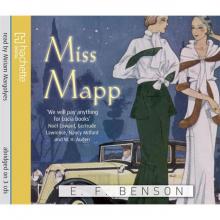 Miss Mapp
Miss Mapp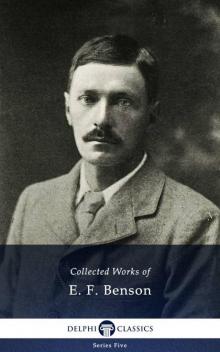 Works of E F Benson
Works of E F Benson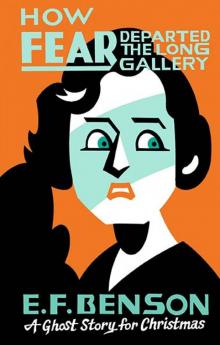 How Fear Departed the Long Gallery
How Fear Departed the Long Gallery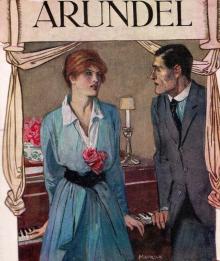 Dodo's Daughter: A Sequel to Dodo
Dodo's Daughter: A Sequel to Dodo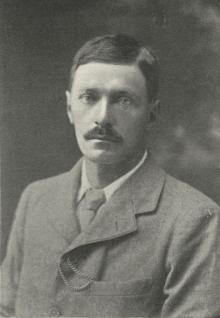 The House of Defence v. 1
The House of Defence v. 1 Queen Lucia
Queen Lucia Night Terrors
Night Terrors Lucia Victrix
Lucia Victrix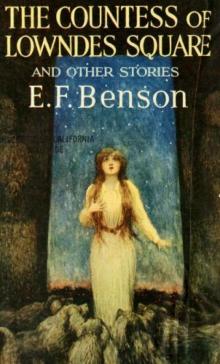 The Countess of Lowndes Square and Other Stories
The Countess of Lowndes Square and Other Stories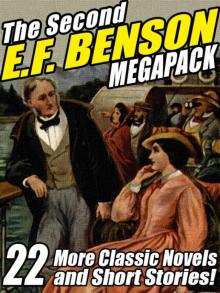 The Second E. F. Benson Megapack
The Second E. F. Benson Megapack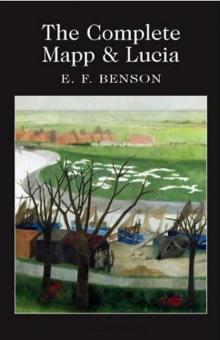 The Complete Mapp & Lucia
The Complete Mapp & Lucia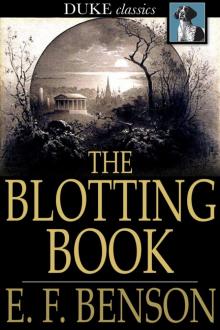 The Blotting Book
The Blotting Book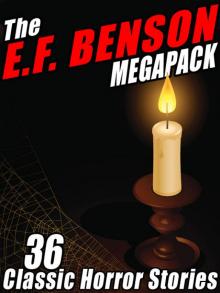 The E. F. Benson Megapack
The E. F. Benson Megapack Lucia Rising
Lucia Rising Ghost Stories
Ghost Stories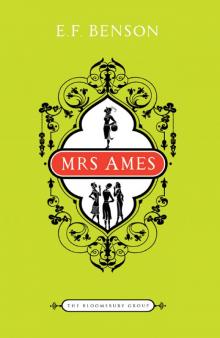 Mrs. Ames
Mrs. Ames E. F. Benson
E. F. Benson